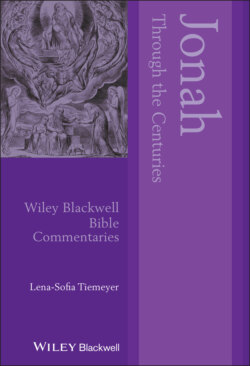Читать книгу Jonah Through the Centuries - Lena-Sofia Tiemeyer - Страница 9
Early Jewish Interpretations
ОглавлениеThere is some evidence of interpretation as early as the Septuagint (LXX). The Greek translation offers four readings that attest either to a Hebrew text that differs from the Masoretic text (MT) or, more likely, interpretations of the MT. First, LXX Jonah 1:6 finds Jonah ‘snoring’, whereas Jonah in the MT ‘sleeps deeply’. Many later interpreters adopt this reading and explore its theological consequences. Second, whereas the MT Jonah 1:9 has Jonah present himself as a ‘Hebrew’, the LXX defines Jonah as ‘as servant of the Lord’. Third, the LXX understands the MT’s fish as some kind of sea monster. This interpretation may be inspired by Greek mythology, where the same term denotes the sea monsters which were slain by the heroes Perseus and Heracles. Fourth, whereas Jonah in the MT gives the people of Nineveh forty days to repent, the LXX gives them a mere three days. Several later Christian interpreters preferred the latter reading as it lent additional support to their typological interpretation of Jonah as a type for Christ (see further below).
There are multiple other examples of Second-Temple-period Jewish interaction with the Book of Jonah. Jonah is mentioned in, for example, the Book of Tobit, Joseph and Aseneth, Testament of the Twelve Patriarchs, 3 Maccabees, and Hellenistic Synagogal Prayers.
A more substantial treatment is found in the Hellenistic sermon On Jonah, probably originating in the synagogue in Alexandria between 25 bce and 50 ce. One significant difference appears in its retelling of Jonah 1:15 where Jonah, according to the sermon, decides to commit suicide rather than allow the sailors to toss him overboard. Another variation concerns Jonah’s time inside the fish. According to the sermon, the fish cares for Jonah as a mother cares for the baby in her womb and takes Jonah on a sightseeing tour of the wonders of the ocean. This ‘detour’ becomes very influential and is later adopted and enhanced by other retellings of the Jonah narrative, exemplified by the Jewish midrash Pirke de-Rabbi Eliezer (PRE).
The Jewish historian Josephus offers an abbreviated version of Jonah in his Ant. 9.206–214, featuring only chs 1–2. He treats the biblical text as a historical record and downplays God’s active role in the narrative, together with all its miraculous aspects. In his hands, the Book of Jonah is turned into a narrative about Jonah’s disobedience and his later prayer to God. Nineveh and its (possible) repentance lose all significance, presumably because Josephus and his intended audience knew about its destruction in 612 bce by, among others, Neo-Babylonian and Median forces.
Among the Qumran scrolls, parts of the Book of Jonah are attested in five manuscripts (4Q76, 4Q81, 4Q82, Mur88, and 8Hev1). These manuscripts preserve three very minor variations, none of which alter the content of the book in any salient way.
1 4Q82 reads Jonah 2:7 [Eng. 2:6] ‘You brought up from the pit my life, My soul, o Yhwh my God’, in contrast to the MT of the same verse, which reads ‘You brought up from the pit my life, o Yhwh my God’.
2 4Q76 reads Jonah 3:2 ‘the proclamation like the one that I spoke’, whereas the MT reads ‘the proclamation that I am speaking’.
3 4Q82 and the MT of Jonah 4:6 use different appellations for God. Yet, although they use different names, both traditions would have been read and pronounced the same way.
